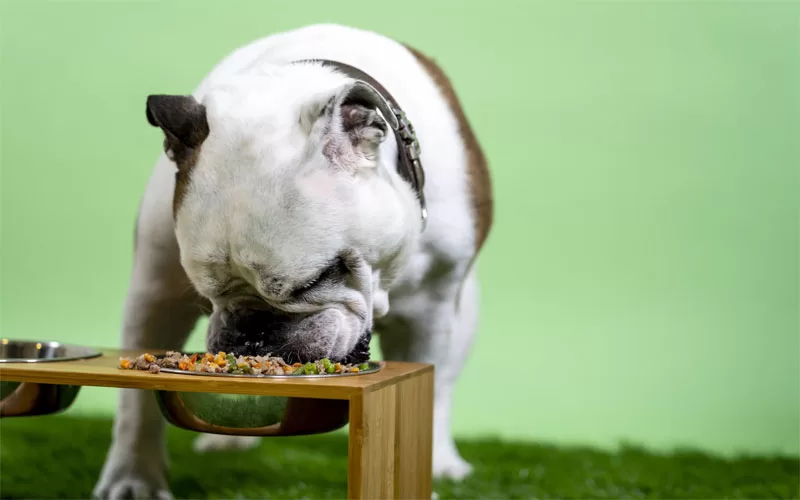
Ensuring your dog’s health and well-being begins with a balanced diet. A balanced diet supports your dog’s growth, energy levels, immune system, and overall vitality. However, navigating the dog food world can be overwhelming, with so many options on the market. A balanced diet is essential for your dog’s overall health and well-being. By taking a proactive approach to nutrition and making informed choices, you can ensure that your pup receives the nutrients it needs to thrive and live a long, healthy life with you.
Let’s explore the fundamentals of a balanced diet for your dog. This includes choosing the right food, portion sizes, and dietary considerations to keep your furry friend happy and healthy.
Protein
Protein is a building block for tissues, muscles, organs, enzymes, hormones, and antibodies, playing a vital role in various physiological functions. Just like humans need protein for muscle growth and repair, dogs do too! Dog protein sources are high-quality, easily digestible, and nutritionally balanced.
Dog protein sources include meat, poultry, fish, and eggs. These protein sources are easily absorbed and utilized by dogs. Protein also keeps your dog full and satisfied after meals, aiding in weight management and preventing overeating.
Vitamins & Minerals
Vitamins and minerals are involved in many physiological processes, including immune function, bone health, energy metabolism, and cell function. When selecting dog foods from pet stores, choosing options that provide a balanced blend of vitamins and minerals designed to meet your dog’s nutritional needs is critical.
Vitamin A, D, E, and B-complex vitamins support vision, bone health, skin and coat health, nervous system function, and overall growth and development. Essential minerals such as calcium, sodium, iodine, magnesium, and potassium are involved in bone and teeth formation. They also involve muscle function, nerve transmission, fluid balance, and enzyme activity.
Healthy Carbs
When selecting dog foods with healthy carbohydrates, look for options that contain whole-food sources of carbohydrates and are free from artificial additives, fillers, and excessive amounts of refined grains. Whole grains, such as oats, brown rice, barley, quinoa, and millet, provide fiber, vitamins, and minerals and are less processed than refined grains. Vegetables such as carrots, peas, sweet potatoes, pumpkin, and green beans are low in calories and rich in fiber, vitamins, and antioxidants. They provide essential nutrients and promote digestive health.
Fruits like apples, blueberries, cranberries, and bananas provide natural sugars, fiber, and vitamins. They can contribute to overall nutrition and palatability. Legumes such as chickpeas, lentils, and beans are nutritious carbohydrate sources of protein and fiber.
Good Fats
Believe it or not, dogs need fat for a shiny coat and healthy skin. Animal fats such as chicken fat, salmon oil, and fish oil are excellent sources of fatty acids, specifically EPA (eicosapentaenoic acid) and DHA (docosahexaenoic acid), which support heart health, joint function, and cognitive development in dogs.
Plant oils such as flaxseed oil, coconut oil, and canola oil can provide additional sources of omega-3 and omega-6 fatty acids. These fats contribute to healthy skin and coats, reduce inflammation, and support your dog’s immune function. DHA and EPA are derived from fish oil. These omega fatty acids are essential for your puppy’s brain development and cognitive function in adult dogs.
Water
Always have fresh water available for your furry friend. Water is essential for digestive processes and nutrition absorption. It helps break down food particles, lubricates the digestive tract, and facilitates nutrient transport throughout the body. Monitor your dog’s water intake and ensure they have access to water throughout the day, especially during hot weather or increased physical activity. If you notice any signs of dehydration or changes in your dog’s drinking habits, consult your veterinarian for guidance.
Portion Control
Providing the right amount of food ensures your dog is fed the correct balance of nutrients. This is critical to supporting their overall well-being and maintaining a healthy weight. Follow the feeding guidelines on dog food packaging based on your dog’s size and activity level. Be cautious about overfeeding; it can lead to obesity and other health problems.
Avoid Harmful Foods
Some human foods like chocolate, grapes, onions, and garlic are toxic to dogs. Keep these out of reach and stick to dog-safe treats and food. Cooked bones, particularly poultry bones, can splinter and cause choking or intestinal blockages. It’s best to avoid cooked bones altogether.
Avocados, macadamia nuts, and xylitol foods can also be toxic. It’s essential to know these harmful foods and keep them out of your dog’s reach.
If you suspect your dog has ingested any of these foods or exhibits symptoms that suggest they have, contact your veterinarian or an emergency animal hospital immediately. This will enable you to receive guidance and treatment.
Leave a Reply